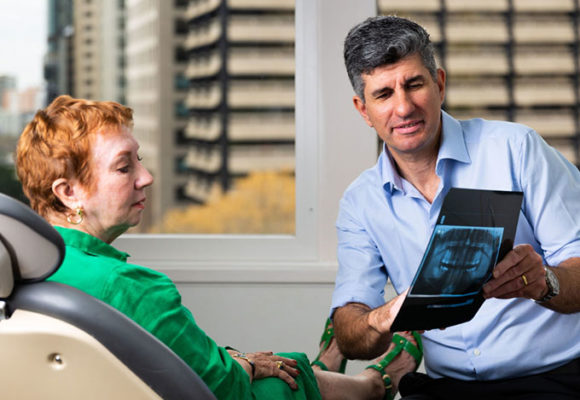Read more about Wisdom Teeth removal in our Procedures section.
The removal of wisdom teeth is a surgical procedure and your post operative care is very important. Unnecessary pain and complications can be reduced to a minimum by adhering to the following instructions carefully.
Please note that these instructions apply to all teeth that are extracted, not just wisdom teeth.
Immediately Following Wisdom Tooth Surgery
You will leave hospital with ice packs on your cheeks however these are usually one time use only and you will need your own ice packs. You can use the blue gel packs that you find at any supermarket or chemist.
Place ice packs to the sides of your face where surgery was performed. Continue to apply ice packs for up to three days.
Vigorous mouth rinsing immediately following surgery should be avoided. This may initiate bleeding by causing the blood clot that has formed to become dislodged.
Mouth rinsing can commence the day after surgery.
Avoid any hot food or beverage on the first night of your surgery.
Take the prescribed pain medications as soon as you begin to feel discomfort. This will usually coincide with the anaesthetic wearing off.
Bleeding
Slight bleeding, oozing, or redness in the saliva is not uncommon. Excessive bleeding may be controlled by placing a damp bite pack eg: damp folded tissue, gauze or tampon over the bleeding area and bite firmly for 20 minutes. Repeat if necessary. If bleeding does not subside within an hour contact the surgery or Dr Chahoud’s mobile if after hours.
Swelling
Swelling is a normal occurrence after surgery and usually peaks 2-3 days following the operation. To minimize swelling, apply ice packs on the cheek in the area of surgery. Apply intermittently (20 minutes on, 20 minutes off) for up to 3 days. Sleep with your head propped up on two pillows to avoid swelling. Stiffness of the jaw muscles may cause difficulty in opening your mouth for a few days following surgery. This is a normal post-operative event which will resolve in time.
Pain Relief
Dr Chahoud will have prescribed appropriate pain relief and this will be dispensed by the hospital pharmacy on the day of your surgery. You should begin taking pain medication as soon as you feel the anaesthetic wearing off. When taking these medications avoid alcohol and driving. For moderate pain, use milder pain medications such as Panadol or Nurofen (no script necessary), reserving the stronger medications for night time if needed.
Antibiotics
Dr Chahoud will have prescribed appropriate antibiotic cover and this will be dispensed by the hospital pharmacy on the day of your surgery. Be sure to take the prescribed antibiotics as directed to help prevent infection. Should you experience a rash or persistent nausea, cease all medications and contact Dr Chahoud’s rooms immediately.
Mouth Rinse and Oral Care
Good oral hygiene is essential to good healing. Do not rinse your mouth on the evening of surgery. Begin tooth brushing and rinsing the day after surgery. Your mouth will be sensitive so we suggest using a baby’s toothbrush which can be purchased at any supermarket or chemist. It has a small head and very soft bristles. Use a pea size amount of toothpaste on the wet brush and massage very gently right over the stitches starting the day after surgery. This will get rid of any food that is floating around the area and more importantly will stimulate the blood cells around the area and help with faster healing. Rinse your mouth with Savacol Mouth Wash at half strength ie half a cap of savacol mixed with half a cap of warm water. Rinse 3 times daily after meals and continue for up to one week after surgery.
Stitches
Stitches will dissolve or come away approximately 5 to 12 days after surgery. There can be a small hole in the gum where the tooth was removed and this will gradually close over the following days. Smoking prior to or after surgery will increase your risk of post operative complications such as infection.
Diet
You can commence eating on the day of surgery, but you must avoid any hot food or drink on this first day. You can begin with soft solid foods and plenty of fluids. Scrambled eggs, fish, mashed vegetables, yogurt is a good example. A soft diet is recommended until your mouth feels comfortable. Eating regularly is very important to avoid nausea caused by the medications. A nutrient rich diet will help you to feel better, have more strength, less discomfort and heal faster. Please see our recommended food list for more ideas.
Activity
Keep physical activities to a minimum immediately following surgery. Resting for at least five days after surgery is advisable to help keep swelling and bleeding to a minimum. Routine exercise can usually commence seven days after surgery.



